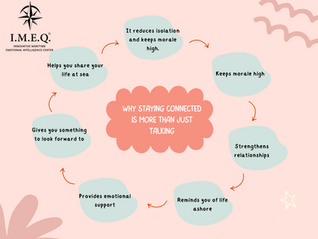The Impact of Shift Work on Mental Health: A Clinical Perspective for Seafarers
- IMEQ CENTER

- Apr 15, 2025
- 3 min read

For seafarers, shift work is a fundamental part of life at sea. Unlike traditional work schedules, shift work involves alternating work hours that extend beyond the typical 9-to-5 routine. This includes rotating shifts, night shifts, split shifts, and extended duty periods—often spanning several weeks or months. Such schedules are necessary to keep ships operational 24/7 but can have serious effects on mental and physical health.
Adding to the complexity, seafarers frequently cross time zones, forcing their bodies to constantly adjust to jet lag-like conditions. This disrupts the body’s natural circadian rhythm, making it difficult to establish a stable sleep pattern. Over time, these disruptions can lead to chronic fatigue, mood disorders, and cognitive impairment.
1. Sleep Disruption and Its Consequences
One of the most immediate effects of shift work is its disruption of the circadian rhythm—the internal clock that regulates sleep, energy levels, and mood. Studies indicate that shift workers are at higher risk of developing Shift Work Sleep Disorder (SWSD), characterized by insomnia and excessive sleepiness (Rajaratnam & Arendt, 2001). Sleep deprivation affects concentration, decision-making, and emotional stability, all of which are critical for seafarers.
How Time Zone Changes Affect You:
Frequent changes in location mean the body is constantly forced to reset its sleep cycle.
Exposure to daylight at unusual hours can suppress melatonin production, making sleep harder to achieve.
Some seafarers may sleep at irregular intervals, leading to fragmented, low-quality sleep.
Scientific Evidence:
A meta-analysis by Kecklund & Axelsson (2016) found that night shift workers were 25-30% more likely to suffer from depression and anxiety disorders.
A study published in the Journal of Sleep Research (2018) showed that shift workers experience reduced REM sleep, which is crucial for emotional regulation and cognitive function.
Practical Tips:
Optimize sleep hygiene: Use blackout curtains, noise-canceling headphones, and eye masks to create a restful environment.
Adjust gradually to new time zones: If possible, shift your sleep schedule by an hour or two before a major time zone change.
Limit caffeine and stimulants: Avoid energy drinks, coffee, and nicotine a few hours before sleep.
2. Mood and Emotional Health
Shift work can lead to chronic stress and emotional exhaustion, particularly due to social isolation and lack of work-life balance. When combined with homesickness, these factors can contribute to depression and anxiety.
How Constantly Changing Locations Affects You:
Inconsistent schedules make it harder to maintain long-term social connections, leading to feelings of loneliness and detachment.
Disconnection from family life can heighten stress and cause emotional strain.
Scientific Evidence:
A study by Wright et al. (2013) found that seafarers who work irregular shifts report higher levels of stress and mood disturbances.
The WHO (World Health Organization) has identified night shift work as a potential contributor to burnout syndrome, which manifests as emotional exhaustion, cynicism, and reduced job performance.
Practical Tips:
Stay socially connected: Regular video calls with family and friends can help maintain emotional well-being.
Engage in onboard social activities: Participating in shared meals, sports, or group activities can foster companionship.
Practice mindfulness techniques: Deep breathing, meditation, or journaling can help regulate emotions and reduce stress.
3. Cognitive Performance and Decision-Making
Fatigue caused by shift work impairs reaction times, problem-solving skills, and overall cognitive function. This is particularly dangerous in maritime settings, where high-stakes decisions need to be made quickly.
Scientific Evidence:
The National Institute for Occupational Safety and Health (NIOSH) found that sleep-deprived individuals perform cognitive tasks 20-50% slower than well-rested individuals (Dawson & Reid, 1997).
A study in Neuropsychopharmacology (2019) reported that shift workers showed reduced cognitive flexibility and slower reaction times compared to daytime workers.
Practical Tips:
Take short breaks: A 10-minute break every few hours can improve alertness and concentration.
Use strategic napping: A short 20-30 minute nap before a night shift can boost cognitive function.
Stay hydrated and eat balanced meals: Proper nutrition supports brain function and energy levels.
Long-Term Health Risks of Shift Work
Chronic exposure to irregular work hours is linked to increased risks of:
Cardiovascular disease: Shift workers have a 40% higher risk of heart disease due to disrupted sleep patterns and increased stress (Vyas et al., 2012).
Gastrointestinal issues: Irregular meal times can lead to digestive problems such as acid reflux and irritable bowel syndrome (IBS).
Weakened immune system: Disrupted sleep patterns can lower immunity, making seafarers more prone to infections.
Final Thoughts: Managing Shift Work for Better Mental Health
Although shift work is a necessary part of maritime life, its impact on mental health should not be ignored. By implementing evidence-based strategies, seafarers can reduce stress, improve sleep quality, and enhance overall well-being. Shipping companies can also play a role by providing better work-rest schedules, mental health resources, and fatigue management training.





































































































Optimize sleep are critical for seafarers